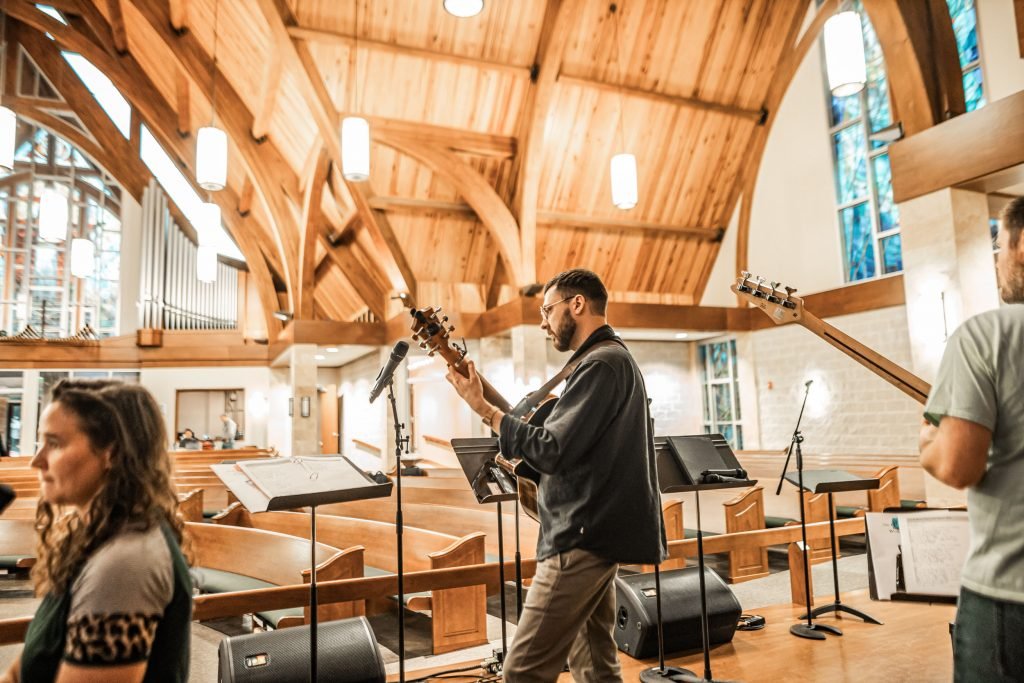
I love worship.
Sometimes I get caught in the repetitive grind of training leaders and playing the same songs over and over again, but most days worship puts a smile on my face. Above all, I love how worship tells a story and invites me into something bigger than myself, invites me to Christ.
There are different kinds of joy in the various worship ministries I lead. I have been working as the music director at my church in Pittsburgh for almost fifteen years now, and when I look out at the congregation I see hundreds of stories that I have been a part of for a long time. I associate every song we sing with a different person, and when I pick songs for a service, I can hear their voices interact with the songs I choose. My work in the chapel program at Grove City College is a lot less intimate, but nonetheless story-saturated. My students bring their stories to worship, and at best I get to be a part of a few of them, but the real story we tell every week is the song of Christ. Years ago I read With One Voice (by Reggie Kidd, an IWS professor), about how Christ is not just the risen Lord, but also the ascended, living, reigning, and “singing Savior.” Every week at Grove City College I get to invite students into God’s story and join the song of Christ through an adapted version of the Lectio Divina. I am constantly amazed at the relevancy of this ancient practice and how Scripture does not just speak to us, but speaks for us in worship and forms our small college community into one that participates in God’s kingdom.
My new record, Forever Amen, has come out of my love for story in worship.
My church and college ministry primarily exist within the context of reformed doctrine and our songs stand on the shoulders of hymnody. One of the great legacies of hymns is that they wed orthodoxy with doxology. I am a theologian because I grew up singing hymns, many of which I dearly love, but over the years I started to feel unsettled with the available resources. Picking hymns can sometimes feel like preaching mini-sermons, each with its doctrinal magnum opus, and if you pick a few hymns back-to-back it can feel like a theological rollercoaster. Popular contemporary songs provide beautiful access to the devotional experience of worship, and I am thankful for how they have awakened my heart. I have been mixing popular contemporary songs with hymns for a long time, but over the years I started to notice something was missing. My worship was a balancing act between devotion and confession; confession of sin and faith when we sang hymns, and sincere devotion when we sang popular modern songs (not to oversimplify). My journey led me to realize that worship was much more than devotion and confession, and I realized that I was trying to tell a story without all the required tools.
I was trying to tell a story in worship, but the songs in my library only helped my devotional posture or reminded me of the truth. I began a journey to find songs that gave me more story power, and I started to search for deeper answers in worship. What I found was not what I expected. I did not find more ballads or anthems; I found the words of the historical church, and I found the words of God.
My first semester at IWS was during the height of COVID-19 social distancing practices, so our class and chapel programs were all online. It was hard to stay focused for an entire week of all-day virtual classes, but I was enraptured by the musical setting of the Lord’s Prayer by Eric Wyse. By the end of that week, I was inspired to begin writing my own version and other songs that enabled God’s story in worship. More than that, over my entire time at IWS, my songwriting gained the focus and clarity that I was looking for.
The voice of the historical church in worship reminds us that the Kingdom of God is not some metaphysical reality in the future, but is an inbreaking of the future eschaton.
Songs that echo the voice of the church catholic, like my setting of the Gloria Patri, invite us into a story of the Spirit’s miraculous care for the faith “once for all delivered” (Jude 1:3) through the hands of the Church. Songs that do not just talk about God, but actually use the words of God from Scripture, like my setting of the Great Commission, invite us into a story that is narrated by Christ that is “living and active” (Hebrews 4:12) in our midst. The story of worship is more than an account of salvation, it is the present reality of God’s Kingdom shared by his people across the globe, in every age and culture. My songs try to help us participate in that story.
I honestly do not know how I was able to write and record two worship records during grad school, (Forever Amen is my second since 2020, Speak Peace was the other), but I think it has something to do with the quality of education my professors at IWS gave me. The stories they invited me into musically, scripturally, doctrinally, liturgically, and contextually, were just what I needed in my journey.
As I look forward to leading, teaching, coaching, writing, and producing more worship, I know I will lean heavily on my time at IWS. Forever Amen is a little glimpse into the fruit of our labors, and I can’t wait to see how my work continues to develop as a writer.
